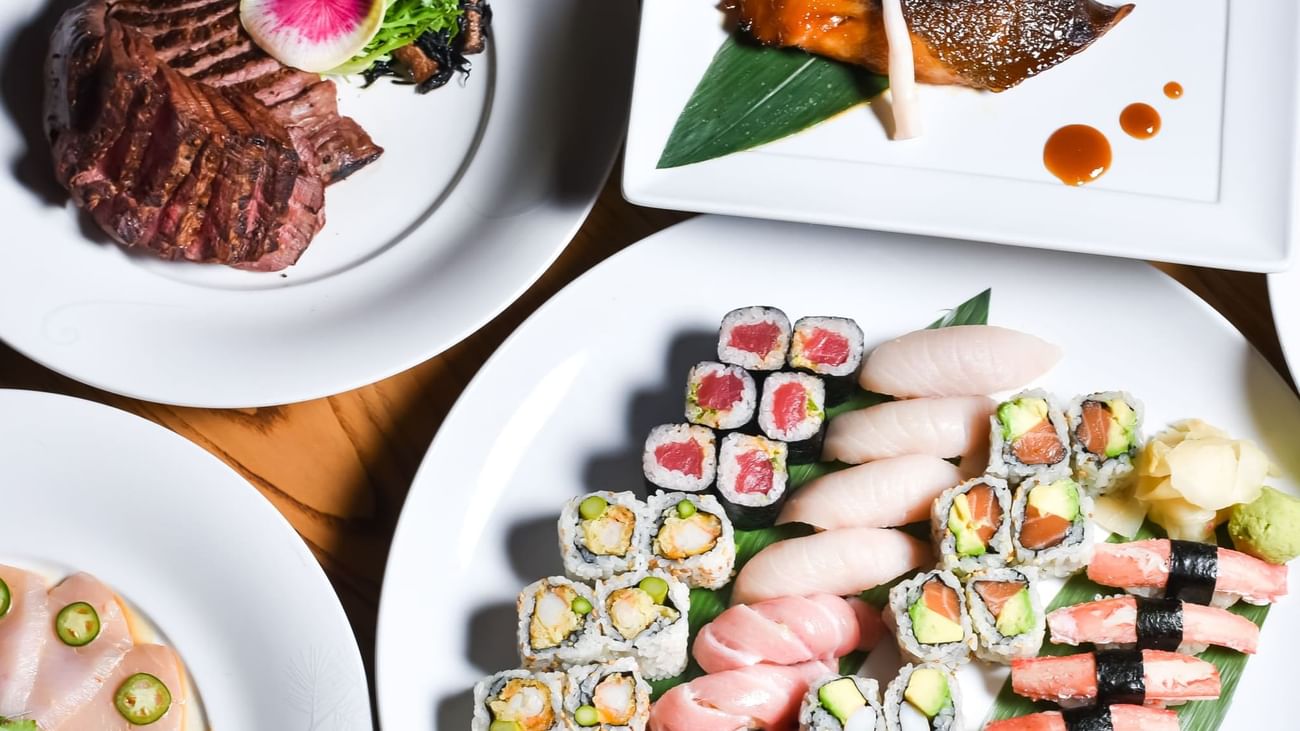
Ten Japanese gastronomic terms you did not know
Nobu Hotel Ibiza Bay, as ambassador of Japanese culture and culinary excellence, is delighted to take you on a passionate exploration of ten hidden gems within this extraordinary realm. First, let us introduce you to ten lesser-known terms that will deepen your grasp of Japan's culinary and hospitality culture, where art, tradition, and innovation blend seamlessly to create an unparalleled dining experience. This will help you better understand and enjoy your Japanese gastro-experience.

Irasshaimase!
As you step into the enchanting world of a Japanese restaurant, a spirited chorus of "いらっしゃいませ" (irasshaimase) fills the air, creating an immediate sense of warmth and belonging. This exuberant greeting, echoing the essence of omotenashi, the art of hospitality, is a cherished tradition in Japan. Uttered with genuine enthusiasm, it translates to "welcome" but extends far beyond its linguistic confines. This joyful proclamation not only invites you to dine but also signifies the restaurant's deep-seated commitment to cater to your every need. The moment you hear this heartfelt salutation, you're not just a guest; you're embraced as a part of an intricate narrative, where culinary craftsmanship and sincere service coalesce into an unforgettable experience.

Kokoro
"Kokoro", a deeply cherished term in Japanese culture, embodies the essence of the human heart and spirit. This multifaceted concept reflects emotions, intentions, and the innermost feelings that shape one's character. In the culinary sphere of Japan, "kokoro" resonates as a profound connection between the chef, their ingredients, and the art of creating a dish. It underscores the importance of cooking with sincerity, respect, and a genuine sense of care. Every preparation becomes an intimate expression, where the chef's kokoro merges with the elements, resulting in not just a meal, but an embodiment of passion and harmony on the plate.

Sushi, Maki, Nigiri, and Sashimi: Unraveling the Tapestry of Flavors
The story of sushi traces back to ancient times when preservation techniques were vital. Originally, fish was wrapped in fermented rice to prolong its shelf life. Over time, this practice evolved into the art form we know today as sushi.

Maki, meaning "roll" in Japanese, is believed to have been inspired by Chinese culinary traditions and developed in the 18th century.

Nigiri, with its precise combination of vinegared rice and fresh seafood, emerged during the Edo period (1603-1868).

Lastly, sashimi, the epitome of simplicity, showcases the purity of raw fish or seafood and is deeply rooted in Japanese culture.

The Art of Tataki: Where Fire Meets Grace
Tataki, meaning "hit" or "pounded" in Japanese, has a fascinating origin. In ancient times, hunters would sear game meat quickly over an open flame to enhance its flavor. This technique not only ensured a delightful sensory experience but also helped preserve the meat. Today, tataki has become synonymous with the delicate balance between searing the surface to perfection while leaving the interior raw, resulting in a harmonious blend of textures and flavors.

Toban and Toban Yaki: A Sizzling Delight
Toban and Toban Yaki are culinary marvels that draw inspiration from the traditional pottery of Japan. The use of ceramic and stone vessels for cooking can be traced back to the Jomon period (10,000 BCE - 300 BCE). The word "toban" refers to the specific type of ceramic or stone vessel used for cooking, while "yaki" means "grilled" or "cooked." These vessels, known for their heat retention properties, are essential for creating dishes that sizzle and delight the senses.

Kushiyaki: A Skewered Symphony
Kushiyaki, which translates to "grilled skewers," has its roots in street food culture. Originally sold by yatai (food stalls) in Japan, kushiyaki offered a convenient and flavorful way to enjoy grilled meats, seafood, and vegetables. The use of skewers dates back centuries, and the cooking method has evolved into an art form, with chefs carefully selecting the right ingredients and marinating them in delectable sauces before grilling them over charcoal, resulting in mouthwatering morsels bursting with flavor.

The Soul of Shuko: Where Tradition Meets Craftsmanship
Shuko, the iconic chef's apron, embodies the spirit of dedication, craftsmanship, and the pursuit of culinary excellence. Its roots can be traced back to the samurai era, where it was worn as a symbol of honor and professionalism. In the culinary world, the donning of the shuko represents a chef's commitment to their craft, showcasing their meticulous attention to detail and reverence for the ingredients they work with. At Nobu Hotel Ibiza Bay, our chefs proudly wear the shuko, embodying the essence of Japanese culinary traditions and crafting dishes that are not only visually stunning but also a testament to the artistry of Japanese cuisine.

Omakase: Surrender to the Maestro's Artistry
Omakase, a dining experience that places trust in the hands of the master chef, has a rich history rooted in the Edo period. During this time, Japan's isolationist policies led to the rise of exclusive dining establishments called ryotei, where customers entrusted their palates to the chef's expertise. This tradition continues today, with the concept of omakase embodying the idea of surrendering control to the skilled chef, who curates a personalized menu using the finest ingredients and showcases the depth and complexity of Japanese flavors.

At Nobu Hotel Ibiza Bay, our love for Japanese culture and passion for culinary excellence converge in an extraordinary celebration of Japanese gastronomy. Each of these ten hidden gems we have explored has a fascinating history and cultural significance, showcasing the artistry and dedication that define Japanese cuisine. Join us on this enchanting journey, as we unlock the secrets, pay homage to the past, and savor the extraordinary flavors that await. Experience the magic of Japanese gastronomy at Nobu Hotel Ibiza Bay, where tradition, innovation, and culinary excellence unite to create a dining experience like no other.


